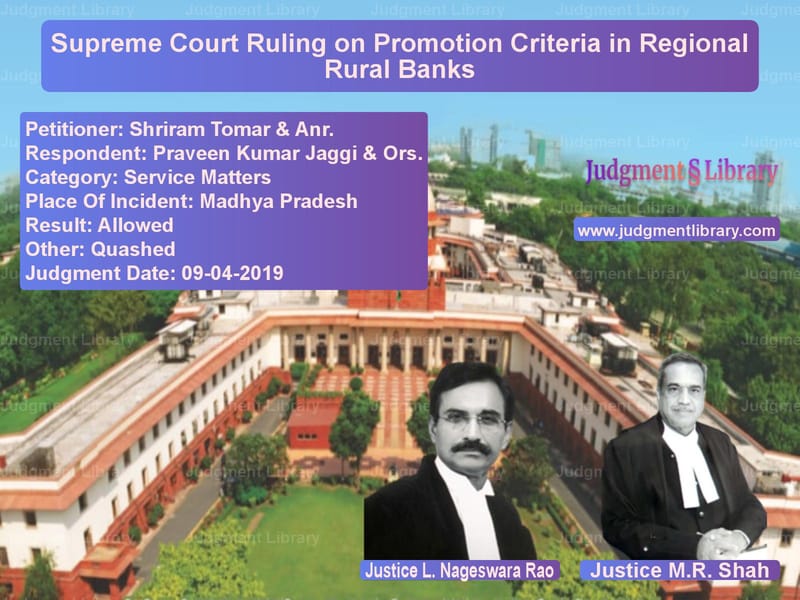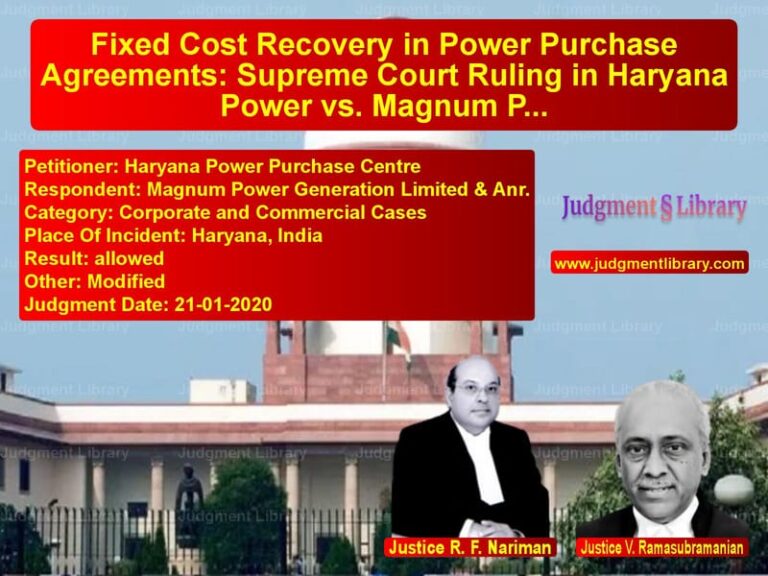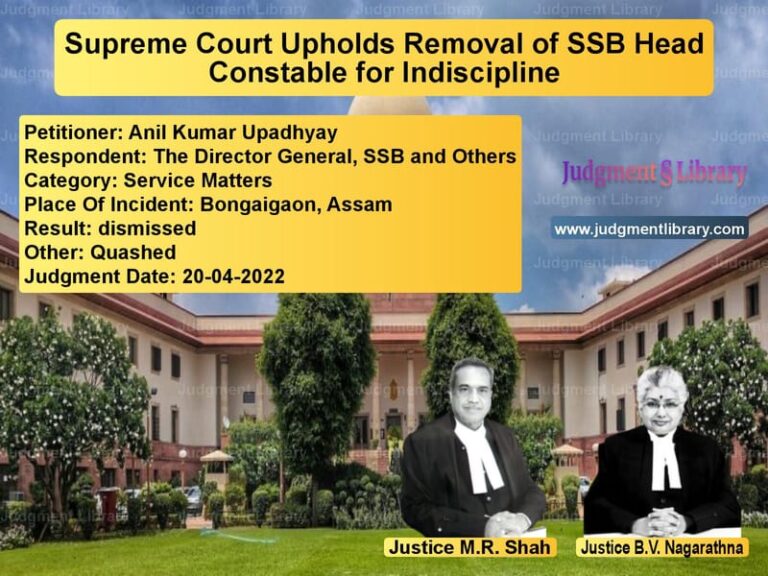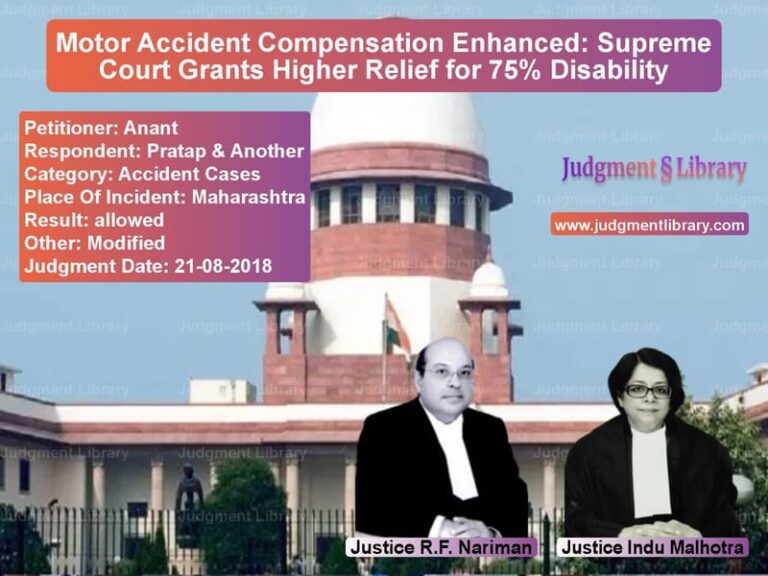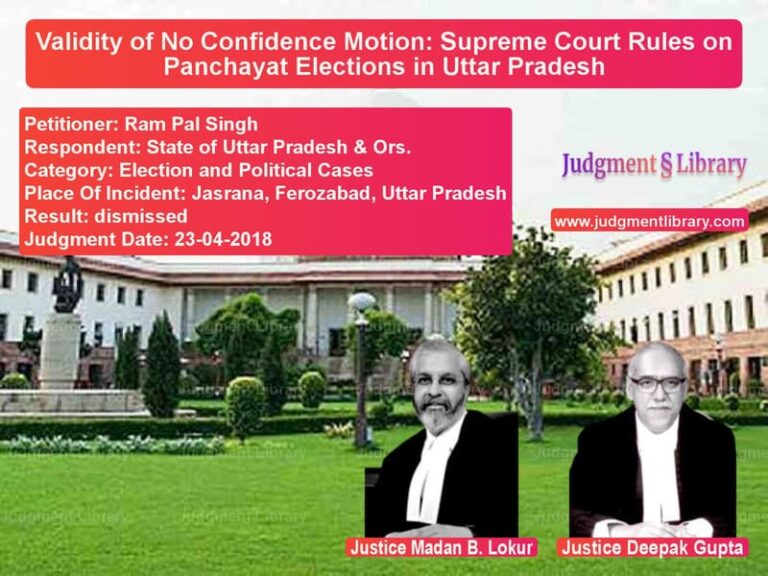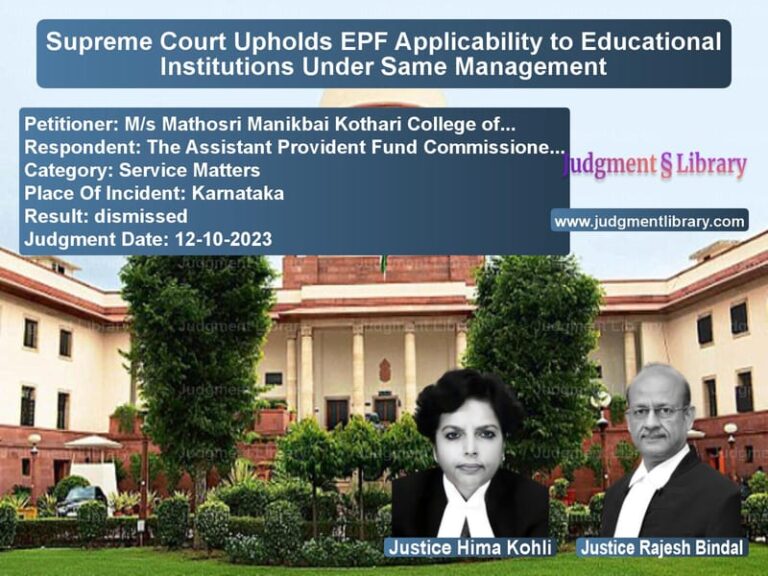Supreme Court Ruling on Promotion Criteria in Regional Rural Banks
The Supreme Court of India delivered a significant judgment on 2019-04-09, resolving a long-standing dispute regarding promotions within Regional Rural Banks (RRBs). The case, Shriram Tomar & Anr. vs. Praveen Kumar Jaggi & Ors., dealt with the interpretation of the Regional Rural Banks (Appointment and Promotion of Officers and Employees) Rules, 1998. The ruling clarified the principle of seniority-cum-merit in promotion exercises.
Background of the Case
The dispute revolved around the promotion process for Junior Management Scale II officers in the Mahakoshal Kshetriya Bank. The controversy emerged when the bank introduced a new selection criterion requiring candidates to obtain a minimum of 12 marks each in the interview and performance appraisal reports. Several senior candidates were denied promotion due to this requirement.
The appellants, Shriram Tomar and Dev Narain Shukla, challenged the promotion process, arguing that it violated the statutory principle of seniority-cum-merit. The dispute escalated through the legal system, with the Madhya Pradesh High Court dismissing the appellants’ plea and directing the bank to conduct a fresh selection process. The case was then brought before the Supreme Court.
Legal Framework and Applicable Rules
The case was examined in light of the Regional Rural Banks (Appointment and Promotion of Officers and Employees) Rules, 1998. These rules specify that promotions in RRBs should be conducted on a seniority-cum-merit basis. This means that while merit is considered, seniority must be given preference unless the candidate is demonstrably unfit for promotion.
Arguments by the Appellants
- The appellants contended that the introduction of a minimum benchmark of 12 marks in interviews and performance appraisal reports was arbitrary and lacked statutory backing.
- They argued that the selection process should prioritize seniority over merit, in accordance with the promotion rules.
- The appellants claimed that their exclusion was unjust as they had cleared the written examination with the required 40% minimum marks.
- They emphasized that setting an additional cutoff without explicit provisions in the rules was discriminatory and deprived them of their rightful promotion.
Arguments by the Respondents
- The bank defended its selection process, asserting that the introduction of a benchmark ensured that only competent candidates were promoted.
- The respondents maintained that performance appraisals and interviews were necessary to gauge leadership abilities, which are critical for managerial roles.
- They also cited administrative discretion, arguing that the selection committee had the authority to impose a minimum cutoff.
- The respondents stated that if seniority were the sole criterion, it would compromise the quality of leadership in RRBs.
Supreme Court’s Observations
- The Court noted that the principle of seniority-cum-merit requires that promotions be granted primarily based on seniority, with merit acting as a secondary criterion.
- It observed that the introduction of a minimum benchmark for interviews and performance appraisals was not explicitly provided under the rules and could not be introduced through administrative instructions.
- The Court emphasized that promotions should follow a structured approach, ensuring fairness and transparency.
- It held that setting a minimum qualifying mark for subjective evaluations, such as interviews, created room for bias and arbitrariness.
- The Court reaffirmed that unless rules expressly permit additional benchmarks, administrative authorities cannot impose new conditions unilaterally.
Final Judgment
The Supreme Court ruled in favor of the appellants and quashed the promotion list issued by the bank. It directed the respondent bank to prepare a fresh selection list, ensuring that:
- Candidates securing the minimum 40% marks in the written test would qualify for promotion.
- No additional minimum benchmark would be imposed for interviews or performance appraisals.
- Promotion would be granted based on seniority after meeting the qualifying criteria.
- The bank must implement the Supreme Court’s directions within three months.
Legal Precedents Cited
The Supreme Court referred to previous judgments that reinforced the principle of seniority-cum-merit in service matters:
- State of Kerala vs. N.M. Thomas (1976) – Reaffirmed that merit-based promotions must be supported by clear statutory provisions.
- R.K. Mobarik vs. Union of India (1994) – Held that an additional benchmark for promotion must have a statutory basis.
Impact of the Judgment
- Fairer Promotion Processes: The ruling ensures that RRB employees are not subjected to arbitrary selection criteria.
- Protection of Seniority Rights: The decision upholds the sanctity of seniority in promotion exercises.
- Transparent Administrative Practices: The ruling prevents authorities from imposing new rules that lack legal backing.
Conclusion
The Supreme Court’s decision in Shriram Tomar & Anr. vs. Praveen Kumar Jaggi & Ors. safeguards the rights of employees seeking promotion based on established legal principles. By upholding the sanctity of statutory rules, the judgment reinforces the role of fairness in service matters.
The ruling sets a significant precedent in service jurisprudence and ensures that employees in RRBs are not unfairly deprived of promotions through discretionary administrative decisions.
Petitioner Name: Shriram Tomar & Anr..Respondent Name: Praveen Kumar Jaggi & Ors..Judgment By: Justice L. Nageswara Rao, Justice M.R. Shah.Place Of Incident: Madhya Pradesh.Judgment Date: 09-04-2019.
Don’t miss out on the full details! Download the complete judgment in PDF format below and gain valuable insights instantly!
Download Judgment: Shriram Tomar & Anr. vs Praveen Kumar Jaggi Supreme Court of India Judgment Dated 09-04-2019.pdf
Direct Downlaod Judgment: Direct downlaod this Judgment
See all petitions in Promotion Cases
See all petitions in Employment Disputes
See all petitions in Public Sector Employees
See all petitions in Judgment by L. Nageswara Rao
See all petitions in Judgment by Mukeshkumar Rasikbhai Shah
See all petitions in allowed
See all petitions in Quashed
See all petitions in supreme court of India judgments April 2019
See all petitions in 2019 judgments
See all posts in Service Matters Category
See all allowed petitions in Service Matters Category
See all Dismissed petitions in Service Matters Category
See all partially allowed petitions in Service Matters Category

